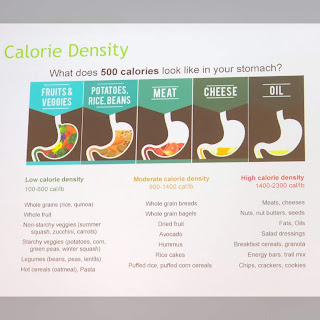Last Friday I had the pleasure of hearing Sharon Wasserstrom, M.D. speak at our Life@UCF session at the UCF College of Medicine. She is board certified in Internal Medicine and Lifestyle Medicine. Her brochure states that she was in the “first class to ever receive board certification in the field of lifestyle medicine from The American Board of Lifestyle Medicine (ABLM).” Dr. Wasserstrom is committed to helping patients “prevent, improve and reverse already established disease” through lifestyle management.
Dr. Wasserstrom began her lecture by telling us that chronic diseases are responsible for 70-80% of all healthcare expenditures. Most chronic diseases are treated with pills and injections that do not address the underlying cause. This is where lifestyle can really impact that disease. There are six components that are addressed in lifestyle management: nutrition, exercise, rest, social connectivity, stress management and cessation of tobacco. Of those, nutrition is the most important.
Then she showed us slide after slide with cases of patients she treated (all names removed) who had reversed chronic diseases such as diabetes, fatty liver, high cholesterol, etc. through starting a whole food plant-based diet. Patients chose whole plant-based foods such as veggies, fruits, beans, lentils, whole grains, nuts and seeds. These foods are full of fiber, nutrients, and promote good health, and are disease-fighting. Of course, on the Candida plan we still have to avoid yeast that may be in some of those foods.
The above slide shows the calorie density of various food items and why you feel full after eating foods with a low-calorie density. Dr. Wasserstrom stressed eating foods in the moderate and low calorie density columns. Again, there are foods there that should be avoided when on the Candida diet, but overall, this diet is very healthy.
Dr. Wasserstrom began her lecture by telling us that chronic diseases are responsible for 70-80% of all healthcare expenditures. Most chronic diseases are treated with pills and injections that do not address the underlying cause. This is where lifestyle can really impact that disease. There are six components that are addressed in lifestyle management: nutrition, exercise, rest, social connectivity, stress management and cessation of tobacco. Of those, nutrition is the most important.
Then she showed us slide after slide with cases of patients she treated (all names removed) who had reversed chronic diseases such as diabetes, fatty liver, high cholesterol, etc. through starting a whole food plant-based diet. Patients chose whole plant-based foods such as veggies, fruits, beans, lentils, whole grains, nuts and seeds. These foods are full of fiber, nutrients, and promote good health, and are disease-fighting. Of course, on the Candida plan we still have to avoid yeast that may be in some of those foods.
The above slide shows the calorie density of various food items and why you feel full after eating foods with a low-calorie density. Dr. Wasserstrom stressed eating foods in the moderate and low calorie density columns. Again, there are foods there that should be avoided when on the Candida diet, but overall, this diet is very healthy.
The above slide was also informative about plant vs. animal proteins. The plant proteins do not contain any cholesterol. By eating plant proteins, cholesterol levels can be improved
A great resource that was mentioned is the 21-Day Vegan app that gives you a kickstart into eating a whole food plant-based diet. Just do a search for it on App Store on your phone. It is free and gives you grocery lists, recipes, etc.
Also, I bought the Kindle version of the cookbook Forks Over Knives which was mentioned in the lecture. It contains over 300 recipes for plant-based eating. The cookbook contains chapters on breakfasts, salads, soups, stews & chilies, wraps, pasta & noodles, stir-fried, grilled & hashed vegetables, beans, grains, casseroles, and desserts. I’m excited to start using recipes from that cookbook.
I will be sharing plant-based recipes this week and will also share a few more resources I learned about at the lecture.


Comments
Post a Comment